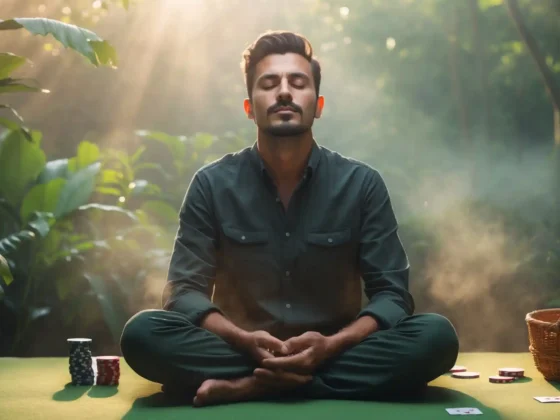The poker table is a battlefield of wits and emotions. It’s a crucible where logic clashes with luck, and where even the most skilled players can succumb to the whims of chance and the pressure of competition. But what if there was a way to navigate this turbulent landscape with greater serenity and control? Enter Stoic Poker, a philosophy that blends the ancient wisdom of Stoicism with the demands of the modern poker game.
Stoicism, founded by Zeno of Citium, emphasizes virtue, reason, and living in accordance with nature. It encourages us to focus on what we can control – our thoughts, our actions, our responses – and to accept what lies beyond our influence. In the unpredictable world of poker, where luck plays a significant role, this philosophy offers a powerful framework for maintaining composure, making sound decisions, and ultimately, achieving consistent success.
Unlike many approaches that focus solely on technical skills and tactical maneuvers, Stoic Poker delves deeper, emphasizing the cultivation of a resilient and balanced mind. It recognizes that true mastery in poker extends beyond card counting and bluffing; it lies in understanding and managing the internal landscape – the thoughts, emotions, and biases that can derail even the most promising hand.
Core Stoic Principles for Poker Players
- Virtue as a Foundation: Stoicism emphasizes four cardinal virtues: wisdom, justice, courage, and temperance. In poker, these virtues translate to playing with integrity, making fair and ethical decisions, having the courage to make tough calls, and exercising self-control in the face of temptation or frustration.
- Reason as Your Guide: Stoicism champions reason as the guiding principle for all actions. In poker, this means analyzing situations objectively, considering probabilities, and making decisions based on logic and sound judgment rather than impulsive reactions or emotional outbursts.
- Control the Controllables: One of the central tenets of Stoicism is the distinction between what is within our control and what is not. In poker, we can control our thoughts, our decisions, our bankroll management, and our approach to the game. We cannot control the cards dealt, the actions of our opponents, or the inevitable swings of fortune. By focusing on what we can control, we minimize stress, reduce anxiety, and improve our overall game.
- Embrace the Present Moment: Stoicism encourages us to live in the present moment, free from the distractions of the past or the anxieties of the future. In poker, this means staying focused on the current hand, analyzing the situation objectively, and avoiding dwelling on past losses or worrying about future outcomes.
Practical Applications of Stoicism in Poker
- Conquering Tilt: Tilt is a common nemesis for poker players, where negative emotions like anger, frustration, or despair lead to irrational decisions and poor play. Stoic principles offer powerful tools for managing tilt:
- Recognize and Acknowledge Tilt: When you feel yourself tilting, acknowledge the emotion without judgment. “I am feeling frustrated right now,” or “I am starting to get angry.”
- Step Back and Breathe: Take a deep breath, close your eyes, and focus on your breathing. This can help calm your mind and regain composure.
- Reframe Negative Thoughts: Challenge negative thoughts and replace them with more rational and objective assessments. Instead of thinking, “I’m always losing,” try “This is a temporary setback. I will learn from this and improve.”
- Focus on Your Process: Remind yourself that you are in control of your decisions and actions. Focus on making the best decisions possible, regardless of the outcome.
- Decision-Making Under Pressure: Stoic philosophy provides a framework for making sound decisions even in high-pressure situations.
- Analyze Options Calmly: Take a moment to analyze your options carefully, considering the potential risks and rewards of each decision.
- Consider Long-Term Consequences: Avoid short-term emotional decisions that could have long-term negative consequences.
- Trust Your Intuition (Grounded in Reason): While emotions should be acknowledged, decisions should ultimately be based on reason and logic, not gut feelings.
- Bankroll Management: Stoicism emphasizes the importance of living within your means and avoiding unnecessary risks. In poker, this translates to responsible bankroll management.
- Play Within Your Limits: Never risk more than you can afford to lose.
- Avoid Chasing Losses: If you’re on a losing streak, take a break and reassess your strategy.
- Focus on Long-Term Sustainability: View poker as a long-term game and prioritize consistent, sustainable growth over short-term gains.
- Cultivating Equanimity: Stoicism encourages us to accept both victory and defeat with equanimity.
- View Losses as Learning Opportunities: Instead of dwelling on losses, analyze them to identify areas for improvement.
- Avoid Arrogance in Victory: Celebrate wins modestly and avoid letting success inflate your ego.
- Maintain a Balanced Perspective: Remember that poker is a game of variance, and even the best players will experience losing streaks.
Stoic Exercises for Poker Players
- Journaling: After each poker session, journal about your experiences. Analyze your decisions, identify areas for improvement, and reflect on how you managed your emotions.
- Mindfulness Meditation: Practice mindfulness meditation to improve focus and reduce stress. Even a few minutes of meditation before a session can help you center yourself and prepare for the game.
- Visualization: Visualize yourself playing confidently and making sound decisions. Imagine yourself remaining calm and collected under pressure.
Beyond the Table: Applying Stoic Principles to Life
The principles of Stoic Poker extend far beyond the felt. By cultivating a mindset of resilience, acceptance, and self-control, you can improve not only your poker game but also other areas of your life.
- Improved Decision-Making: Stoic principles can help you make better decisions in all areas of life, from personal relationships to career choices.
- Increased Resilience: The ability to withstand setbacks and bounce back from adversity is crucial in all aspects of life.
- Enhanced Emotional Intelligence: By understanding and managing your emotions, you can build stronger relationships and navigate life’s challenges with greater ease.
Conclusion
Stoic Poker is more than just a strategy; it’s a philosophy for navigating the complexities of the game with grace and resilience. By embracing Stoic principles, you can cultivate a mindset that transcends the ups and downs of the game, enhancing your performance and enriching your overall poker experience. As Marcus Aurelius observed, “The happiness of your life depends upon the quality of your thoughts: therefore, guard accordingly, and take care that you entertain no notions unsuitable to virtue.“ 1 Cultivate a mind that is focused, resilient, and accepting, and you’ll not only improve your game but also enrich your life beyond the felt.
For a deeper dive into Stoic philosophy, we recommend visiting the website of the American Stoic Society.








1 comment